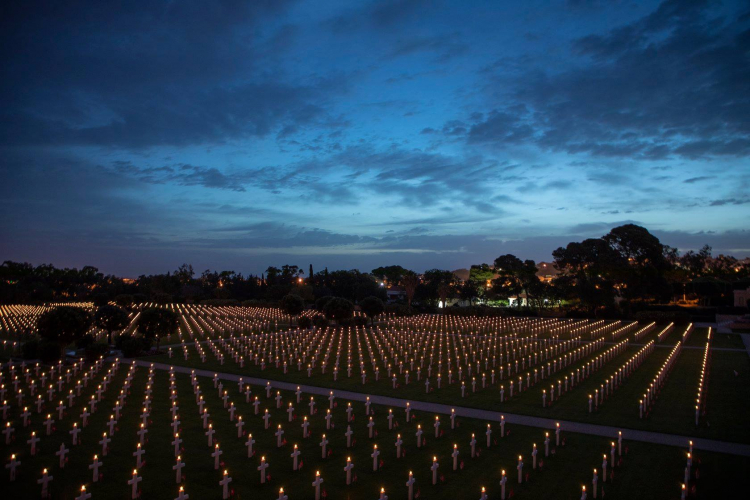The Cemetery Life: a Personal Approach to War Commemoration

In the spring of 2016, I was sitting across the table from the guy I liked in a bar in my neighborhood, listening to him tell me he had given up a prestigious masters program and was getting ready to move away from Paris. I was disappointed he was moving away, thinking I'd never see him again, but I was mostly confused: he was going to live in the middle of nowhere to work in a cemetery. Little did I know I'd eventually agree to marry him, and that the cemetery life would become mine.
Having a partner who works for the American Battle Monuments Commission implies a series of rather unusual obligations for a young master's student, including a bunch of military ceremonies and world war related events taking place in the final resting place of thousands of service members. It also leads to a profound understanding of the importance of commemoration, as we are about to celebrate the 100th anniversary of the end of the First World War.
The first time I stepped foot in my partner's workplace, I knew little about the American Battle Monuments Commission, a government agency in charge of 26 military cemeteries around the world, mostly from the world wars. As a Franco-German, whose existence would have gotten my mother's head shaven 75 years ago, I found it ironic to be taking down the flag flown over the headstones of American service men and women who lost their lives fighting along, as well as against, my ancestors.
And yet, over two years later, walking among headstones has become part of my routine. Sitting down on a bench to read my book and take a well deserved disconnected break, and pay my respects to the fallen is nothing out of the ordinary to me. Whenever I meet new people and they ask me why I live in between Paris and Tunis, they are always quite surprised my answer involves the North Africa World War II campaign. Some think living with someone who manages a cemetery is interesting, some, understandably, think it is creepy.
I'll admit: the very first night I could see a sea of white crosses from my window, when my partner was first posted in Belgium, left me with a shivering sensation. But as I became more involved in his work, my first impressions were quickly dissolved: the site was incredibly peaceful and beautiful, with clean, intact white marble headstones and green grass growing, unlike the regular grim European cemeteries I had encountered a few times before.
Being around the cemetery, I also felt a growing connection with the people buried in my "backyard". Having to translate letters from service members to their family, to make them available to the local public, allowed me to realize how similar those people were to me: they liked cookies. They were also bored due to the lack of action and communication, and worried about their friends and family left behind. Their sacrifices made them heroes, but to begin with, they were regular people who hoped to make it through the war.
Image Credit: Julie BouletOvertime, I found myself reading more war-related books, borrowing my partner's copy of Bert Stiles' Serenade to the Big Bird. I kept thinking the fighter pilot, whose plane crashed in 1944 and is currently buried at the Ardennes American Cemetery, could have been any boy I grew up with, a regular young man who, out of fear to let his brothers-in-arms down, refused to head back home after completing his tour, eventually losing his life.
Personal stories are always more relatable than what is taught in history lessons. While learning about military campaigns is essential to understanding today's current events and geopolitics, being able to feel a personal connection with someone who died 100 or 75 years ago might have a stronger impact on us: We are able to understand that despite the generations that separates us, we are the same and ultimately strive for the same things.
With the World War I Centennial coming up this Sunday, it is critical for governments, agencies, teachers, and parents to remind younger generations of the impact of war. In an era where war seems so distant, where presidents have never served in the military, we need to be reminded that when we wage war, it is not an army of clones that is sent into combat, but our brothers, sisters, sons and daughters.
We need to be reminded that if men and women gave up their life for a greater cause to fight because of political, societal or racial tensions, or to rid us of evil ideology, it is our duty to honor their memory and not let history repeat itself. It is our generation's turn to step up and better our world.








